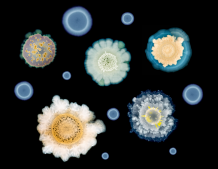
Should I Stay Or Should I Go - Tim Cockerill and Elze Hesse
Should I Stay or Should I Go? – new exhibition offers fascinating insight into Cornwall’s hidden world
A stunning new exhibition will offer a fascinating glimpse into the colourful and often kaleidoscopic world of bacteria, hidden out of sight throughout the distinctive Cornish landscape.
The striking photographic exhibition, called Should I Stay or Should I Go?, depicts the complex social behaviour of bacteria commonly found in soil samples from the local area.
In particular, the dramatic images highlight the effect of social and environmental cues on swarming behaviour – where new cells are directed to uncrowded areas rich in nutrients – in the bacteria.
The exhibition opens on Friday February 28th At the Environment and Sustainability Institute (ESI), at the University of Exeter’s Penryn Campus, Cornwall.
The event draws together the collaborative work of Dr Tim Cockerill from the Institute of Photography at Falmouth University and Dr Elze Hesse from the University of Exeter’s ESI.
Tim, a photographer and science communicator, specialises in the art of macrophotography – or producing photos of small items in larger than life prints.
His work centres around ‘championing’ organisms that are often overlooked because of their size.
Dr Hesse, a Research Fellow at the ESI, specialises in studying how species interactions are affected by environmental challenges.
For their collaboration, Tim and Elze have been carrying out testing on Paenibacillus - a gram-positive bacterium often found in soil- to determine whether social cues elicited by other species affect swarming behaviour.
For the project, some of the bacteria were isolated from soils contaminated with metals and other industrial residues, from the local area.
Speaking ahead of the launch of the exhibition, Dr Hesse said: “Throughout my career I have always been interested in how environmental change may alter the strength and nature of species interactions and how we can manipulate these interactions to our own benefit.
“With this exhibition I hope to demonstrate that microbes display complex social behaviours, the nature of which can greatly impact our personal and collective well-being – it determines microbial virulence, growth and antibiotic resistance.”
Tim added: “My background spans the sciences and arts so the chance to collaborate with Elze on this project has been a wonderful opportunity. The idea of bacterial colonies can often be viewed as a very negative thing but we hope this exhibition offers a chance for people to see the true natural wonder and beauty that they possess.”
The exhibition is part of the ESI’s Creative Exchange programme, a series art-science collaborations on the topic of UNDERWORLDS.
In a series of four projects, artists and researchers are exploring themes of the underground, the undersea, the hidden and the microscopic.
Collaborators use scientific techniques and creative practices to better understand the habitats and behaviour of subterranean and submarine lifeforms, and work with earth pigments and ocean sediments to produce visual representations of invisible or inaccessible worlds.
Several of the projects engage with the specificity of the Cornish landscape, and its legacy of mining and mineral extraction.
Elze said: These Creative Exchanges attract people from various backgrounds, thereby facilitating a dialogue between researchers, artists and the general public. The use of macro–scale photos enables us to convey an important but often overlooked message – whether microbes cooperate or harm each other impacts our daily lives.”
Should I Stay Or Should I Go? is available for public viewing Environment and Sustainability Institute, Penryn, from Friday, 28 February to Friday, 3 April. The ESI is open Monday to Friday 10am- 5pm, admission is free.
The event is part of the University of Exeter’s Arts and Culture Strategy, which celebrates the University’s outstanding contributions to arts and culture in Devon and Cornwall.
It promotes international cultural relationships and dialogues, through highly-ranked arts research and teaching, practice and performance.
For more information, please visit the Arts and Culture website.
Date: 28 February 2020
